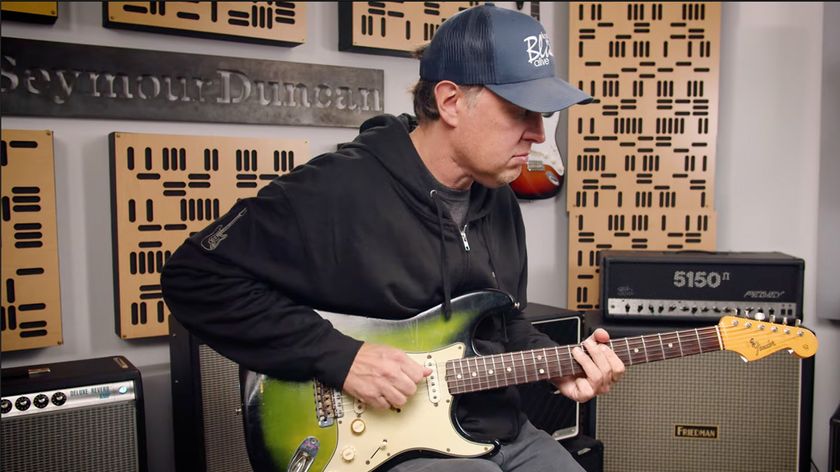Best high-end acoustic guitars 2025: Deluxe acoustics delivering pro-quality performance for serious players
Vintage classics and new-school builds from Taylor, Gibson, Martin and more…
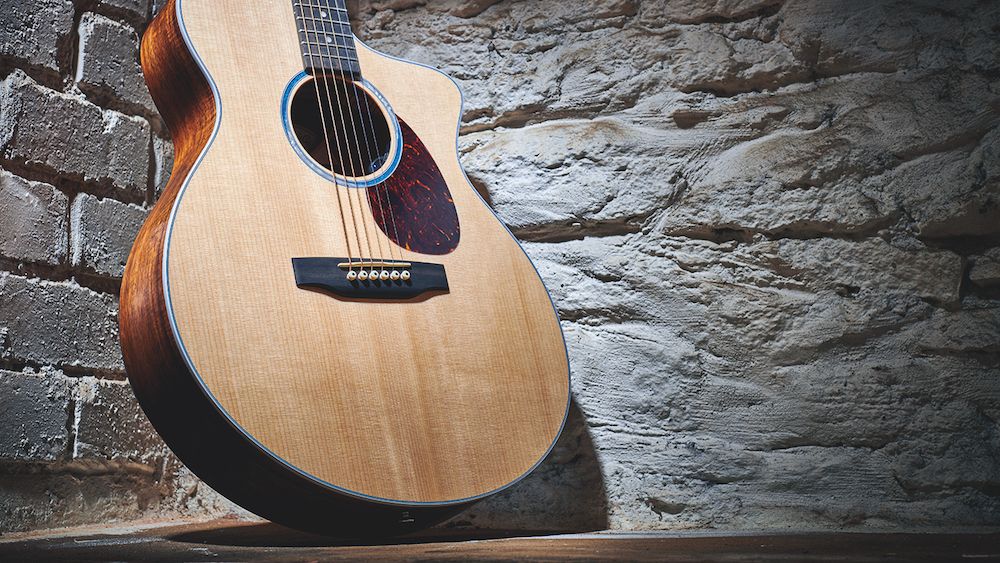
One of the best things about today’s guitar market is the sheer number of fantastic options you have at all price points, and this is true of the acoustic guitar. But, that said, with an acoustic guitar, the more you spend, the greater the reward. Looking for options? These are the best high-end acoustic guitars you can buy right now.
In this guide we are looking at acoustic guitars that will set you back a grand or more. How much you want to spend on a guitar is often how much you can afford. We’ve resisted the urge to simply fill the list with 900 Series Taylors and the eight-grand Martin D-45, but taking $/£1,000 as our starting price, these, for our money, are the best options available today.
There are acoustics for all styles here, some smaller-bodied options, some with electronics, some without. All are exceptional, the sort of guitar that will elevate your playing and your experience with the instrument, which is what we are all looking for.
Best high-end acoustic guitars: MusicRadar's Choice
The Gibson Montana Hummingbird needs little introduction and besides, just as you’d clear your throat to do so, that Heritage Cherry Sunburst will have caught everyone’s attention. It’s a sublime instrument, Gibson’s first square-shouldered dread, played by Keith Richards, Bob Dylan… It sounds big, detailed, inherently musical – nigh-on perfect.
The size of the Lowden 32SE Stage Edition makes it a great all-rounder. Its LR Baggs Anthem pickup and preamp makes it ideal for the stage. But what makes it truly exceptional is the attention to detail and craft on display. Every acoustic that leaves George Lowden’s premises is special – the O32 was certainly considered for this list. They don’t get any more versatile than the 32SE. It’s a crowd-pleaser in every sense.
Best high-end acoustic guitars: Product guide
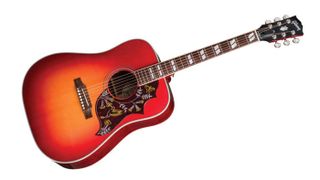
Specifications
Reasons to buy
Reasons to avoid
The Hummingbird has a discography that would rival any other guitar in history, and to this day it remains the most-loved acoustic in Gibson’s lineup. Available in Antique Natural or Heritage Cherry Sunburst, the latter the most recognisable, it is a sumptuous square-shouldered dreadnought.
Measuring 16 inches across the lower bout, the Hummingbird’s dimensions allied to its Sitka spruce top and solid mahogany back and sides, helps endow it with an authoritative voice that can hold its own in any mix or under the spotlight unaccompanied.
The tone is loud and bold but it’s also warm, with a solid low end underpinning a bright musical clarity across the mids and highs. A discrete LR Baggs under-saddle pickup makes this stage-ready, but for recording, you’d want to put your best mic in front of this and let the wood and steel do the talking.
Read the full Gibson Montana Hummingbird review
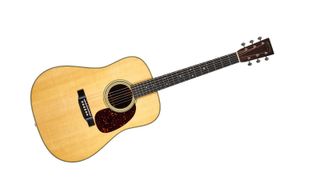
2. Martin Reimagined Series D-28
Our expert review:
Specifications
Reasons to buy
Reasons to avoid
The D-28 is another classic, popularised Johnny Cash, Neil Young, the Beatles… And so on. Its well-balanced, warm and powerful voice delivers a textbook example of dreadnought tone from the company that pioneered the shape.
Now, this D-28 might look familiar, the Sitka spruce on top, East Indian Rosewood on back and sides, but it was revised in 2017, with a forward-shifted, non-scalloped X bracing pattern and an increase in nut width from 42.86mm to 4.45mm. Altogether, with the modified low oval neck profile, it makes the D-28 that little bit more versatile.
It is certainly very welcoming to fingerstyle players without alienating the core dreadnought player’s guild, who know and love it for those boom-chicka-boom open-chord spectaculars that fall so readily out of its hallowed soundhole. There’s a little less boom on this one, but its EQ profile and voice remains a classic. This one’s got songs in it.
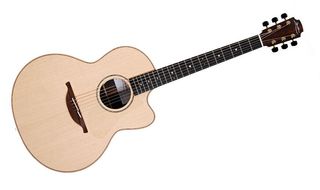
Specifications
Reasons to buy
Reasons to avoid
No list of high-end acoustics can be complete without a Lowden, and you could well mount a case for the 32SE Stage Edition being the best cutaway electro-acoustic all things considered. Firstly, it’s down to the craft. From the tonewood choice, right through the “Dolphin Profile” bracing and to the hand-rubbed satin finish – there’s nothing out of place.
The 32SE has a clean design, with an understated abalone and rosewood rosette and sycamore binding. At 95mm, it is the thinnest Lowden body, but what you might lose in low end you make up in its breathtaking articulation – not to mention a wholly feedback-free performance.
It will take all styles. The 43.5mm nut width might be a little more cramped than the typical Lowden 45mm, but factor in the 55mm string spacing at the bridge, the soft V profile neck, and we defy any player not to find this one of the most comfortable acoustics on the market. Equipped with an LR Baggs Anthem pickup and preamp, discretely mounted in the soundhole, the 32SE is EQ’d for the stage, should sit just nicely in the mix, and is a triumph.
Read the full Lowden 32SE Stage Edition review
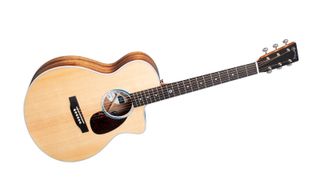
Specifications
Reasons to buy
Reasons to avoid
Here’s where Martin takes the electro-acoustic rule book and fires it straight into the sun – with spectacular results. Now that everyone is over the shock of the new, can we all acknowledge that this is one of the coolest new designs in acoustic guitar history? No exaggeration.
Aesthetically, it’s confounding, an offset cutaway with an expansive Venetian cutaway allowing you to access almost the entire fretboard. Sure, you say, who goes beyond the 10th fret? Well, here’s the thing; the SC-13E is a crossover in every sense of the word, with the action so low and the asymmetric neck profile, it has the playability of an electric. Indeed, there is hardly a heel to speak of.
The Sure Align neck system lets you adjust neck pitch and intonation on the fly. While the Fishman MX-T system lacks the tweakability of similarly priced Taylors, it is nonetheless a fine performer, bringing the SC-13E’s voice – sort of OM/OOO-esque – to the amplifier without stepping on the tone.
Read the full Martin SC-13E review
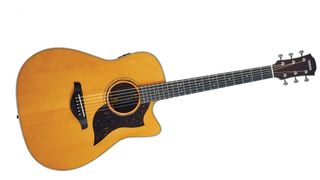
Specifications
Reasons to buy
Reasons to avoid
Maybe because the world is used to seeing the Yamaha name on outboard motors, motorbikes and clarinets, we tend to take their immaculately constructed guitars for granted. But when you pick up an electro-acoustic like the A5R ARE you’re immediately overcome with a sense of awe that an instrument such as this deserves.
The recipe is familiar. The solid Sitka spruce on the top is complemented by the warm depth of solid rosewood, but with Yamaha’s ARE tech artificially ageing the top, the A5R sounds like it was put together some decades ago, with a lot of that forensic detail you get in old, worn-in acoustics.
The electronics on this are bang-on. They’ll take your tone and amplify it accurately, and with treble and bass controls and a piezo/SRT blend control, dialling in tones for a live mix is easy. As is the ride. The neck feels quick, with rolled fretboard edges, and a 43mm nut width that does well to meet fingerpickers and strummers somewhere down the middle.
Read the full Yamaha A5R ARE review
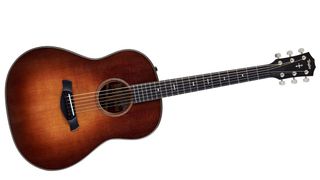
Specifications
Reasons to buy
Reasons to avoid
Taylor’s Grand Pacific body shape offers something fresh for those who want a dreadnought’s volume but prize the top-end clarity that you would get from a smaller-bodied guitar.
Acoustically, the Builder’s Edition 517e is loud, assertive and balanced, with Andy Powers’ V-class bracing once again serving as an example as to why it is one of the most exciting developments in modern acoustic guitar design.
The tone feels as though it has been through a soundboard. EQ’d from the beyond. The torrefied Sitka spruce top buffing the 517e’s tone up to a shine, with the tropical mahogany ensuring there’s low-end substance behind it.
This makes a fine choice for a serious player looking for a high-end acoustic that’s dependable in a variety of situations. The Expression System 2, which mounts the piezo behind the saddle, allows the 517e to be amplified without being robbed of its soul – as some plastic-sounding piezos are wont to do.
Read the full Taylor Builder’s Edition 517e Grand Pacific review
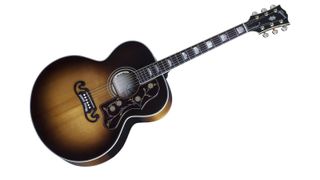
Specifications
Reasons to buy
Reasons to avoid
There is a strange sort of pressure that befalls the player who picks up the SJ-200, and it’s the weight of history. Like the Hummingbird and the D-28, the SJ-200 feels as though it’s part of the very fabric of our popular culture.
But don’t sweat it. You don’t have to write songs like Dylan or wear a rhinestone jumpsuit to make the SJ-200 sing with some of the sweetest acoustic tones you’ll find on this Earth. You don’t have to be a fingerpicker or a strummer – the SJ-200 accommodates both. Just so long as you can meet the asking price, it will reward you in tone and feel.
Is it too ostentatious? Well, the rosewood ‘moustache’ bridge, floral pickguard and five-ply binding adds a sense of old world bling, but whether finished in Vintage Sunburst or Antique Natural, the SJ-200 wears it well. It’s the best jumbo ever made.
Read the full Gibson Montana SJ-200 Standard review
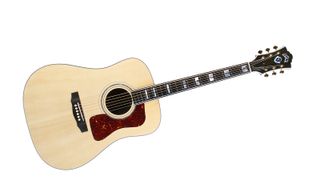
Specifications
Reasons to buy
Reasons to avoid
The D-55 is Guild's dreadnought, very similar in shape to the all-conquering 14-fret Martin on which it's based. However, if you're used to a handful in the neck, the D-55 dreadnought makes for quite the contrast: a gloss neck, and slimmer nut accentuating the neck's overall thinness; more a D than a C profile, to invite comfortable first-position chords, aided by an impressively low action.
That Adirondack bracing is doing its job, too, because string separation, definition and dynamic range are all notable and it feels loud, alive and resonant when playing soft or hard. If this guitar is anything to go by, the latest Traditional models are absolutely up there with the other big American names, offering superb quality craftsmanship and world-class tone.
The D-55 is a potentially serious workhorse that has every likelihood of outlasting and outperforming any one of us as long as we can keep on picking - a sumptuous strummer.
Read the full review: Guild Traditional D-55
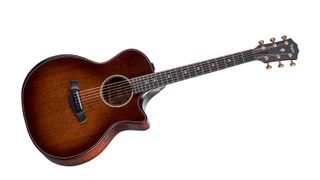
Specifications
Reasons to buy
Reasons to avoid
Here’s a planet-friendly, player-friendly electro-acoustic from Taylor that sees a solid mahogany top complemented by Urban Ash on the back and sides. Urban Ash is recovered from the Shamel ash trees that grow among California’s inner-city and suburban areas. Why not make guitars from it?
Andy Powers believes Urban Ash is not unlike mahogany, with a warm voice, musical low end and complicated midrange that works so well in the mix.
He’s not wrong. Allied to Taylor’s exemplary V-Class bracing, the 324ce is a well-balanced electro-acoustic. The onboard Taylor Expression System 2 makes it ready for the stage and it is a joy to play, with the upper bout’s armrest always a welcome addition. Oftentimes, you’ll play a Taylor and it is like a taste of the acoustic guitar’s future. With these new sustainable tonewoods – not to mention the West African ebony on the fretboard, sourced from Taylor’s own project – that taste is pretty sweet.
Read the full Taylor Builder's Edition 324ce review
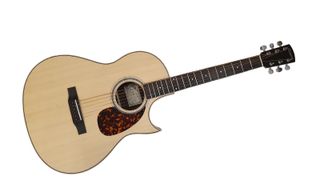
Specifications
Reasons to buy
Reasons to avoid
Tommy Emmanuel is most famously associated with his signature Maton guitars that you’ll see him on tour with, but his go-to acoustic in the studio is a custom C-10 12-fret cutaway that Jean Larrivée built for him some 20 years ago. The C-03R-TE is, in effect, a tribute to that guitar, and was designed by Emmanuel and Larrivée.
The finish is typically Larrivée, perfect. The action is so low, just how Emmanuel likes it, and it makes for a supremely playable instrument that invites players to play right to the edge of their capabilities.
Tone-wise, it’s got a dreadnought’s oomph and weight to it, but with a little more balance. You’ll soon appreciate why Emmanuel favours this style in the studio; it’s so dynamic, responding well to quiet fingerstyle and digging in with a pick, while that Florentine cutaway makes the whole fretboard up for grabs.
Read the full Larrivée C-03R-TE Custom review
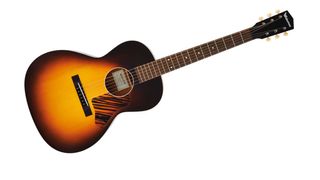
Specifications
Reasons to buy
Reasons to avoid
The WL-14 recreates the vibe, tone and feel of the Kalamazoo-era Gibson L-00 acoustics, made at a time when the Depression was ravaging the world, Gibson guitar sales included. They were budget acoustics – the small-bodied and barefoot siblings of Gibson’s more illustrious builds – but for playing fingerstyle blues, country or folk music in the key of Woody Guthrie, there’s nothing quite like them.
You will find more pristine acoustics but few with the charm. Offered with ladder-style bracing that Bill Collings says leaves the tone big and open with a midrange honk, or with X-pattern bracing for tighter tones that still remain laser-focussed on making sure the punch lands in the midrange
Blues, picking, songwriting… These are the simple pleasures in life, and the WL-14 is built with an understanding of this. The WL-14 is like a portal to an era long buried by time and technological advancements.
Read the full Waterloo WL-14 X review
Best high-end acoustic guitars: Buying advice
Now, the last thing we’d want to do is rewire any carefully constructed fiscal logic that informs your gear purchases, but spending a little more on your acoustic guitar makes sense.
A decent electric guitar can sound utterly transcendent when played through a high-end guitar amp and some well-chosen effects pedals, but the acoustic has to deliver the magic under its own steam, and that magic comes a little easier when you spend a little more.
The best high-end acoustics on our list are typically using the finest materials. Solid Sitka spruce, East Indian rosewood… All solid, of course. Well, that’s what we expect, right? And there is plenty of that here.
Now, the best guitar builders are challenging our expectations of what a great acoustic should be with designs existing outside of the established paradigm of ‘spruce for treble brightness, mahogany/rosewood for bass and depth’.
We’ve got Taylor introducing Urban Ash into the equation. We have Martin creating crossover guitars that have an electric’s playability but with an acoustic electric guitar that sounds much in keeping with the name on the headstock.
This is an exciting time for acoustics. Today’s players are developing new techniques and pushing the frontiers of the instruments. Builders are taking best practice into the 21st century, with vintage and contemporary design sitting side by side in the guitar store, and, on occasion, on the same guitar.
Find out more about how we test music gear and services at MusicRadar.
Related buyer's guides
MusicRadar's got your back
- The best acoustic guitars under $/£1,000
- On a budget? These are the best acoustic guitars under $500/£500
- Boost playing comfort with the best guitar straps
- Best acoustic guitar pickups for every type of player
- The best acoustic guitar amps for buskers and gigging guitarists
Get the MusicRadar Newsletter
Want all the hottest music and gear news, reviews, deals, features and more, direct to your inbox? Sign up here.
Jonathan Horsley has been writing about guitars and guitar culture since 2005, playing them since 1990, and regularly contributes to MusicRadar, Total Guitar and Guitar World. He uses Jazz III nylon picks, 10s during the week, 9s at the weekend, and shamefully still struggles with rhythm figure one of Van Halen’s Panama.

“You would get suspended for even having a guitar”: Brian May says it was “illegal” to have a guitar at his school – but he and his friends played during lunch hour anyway

“Gibson was able to put the universe on it… the planet Mercury is here, and that is a little nod to a friend of mine”: Inspired by the stars and co-designed by the Queen guitarist, Gibson unveils exquisite Brian May SJ-200 12-String

